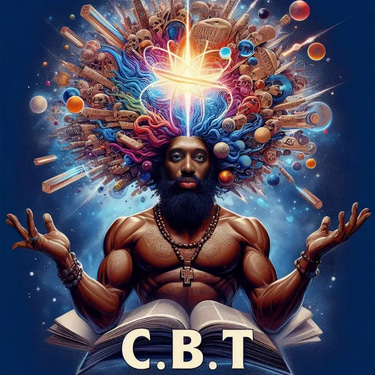The Fossil Record: A Key Piece in the Young Earth Creationism Puzzle
Investigate the role of the fossil record in the young earth creationism puzzle. Advocates argue for a young Earth, challenging mainstream science. Yet, evidence from paleontology, geology, and radiometric dating supports an ancient Earth and life evolution. Expand your mind into the rich history revealed by the fossil record, sparking a debate on the intersection of faith and science. This ongoing discourse emphasizes critical thinking, open dialogue, and the pursuit of knowledge to better understand our world.
James Cassel
1/16/20245 min read


My post content
INTRO TO YOUNG EARTH CREATIONISM AND THE FOSSIL RECORD
Young Earth Creationism is a belief system that holds that the Earth and all life on it were created by a divine being within the last 10,000 years. This perspective stands in contrast to mainstream scientific theories, which assert that the Earth is approximately 4.5 billion years old and that life has evolved over millions of years. One of the key points of contention between young earth creationism and mainstream science is the interpretation of the fossil record. The fossil record, which is the collection of remains and traces of past life preserved in rock layers, provides significant evidence for the age of the Earth and the evolution of life.
Understanding the principles of young earth creationism
Young Earth Creationism is rooted in a literal interpretation of religious texts, particularly the Bible. According to this perspective, the world was created by God in six 24-hour days, with each species being separately created. This view rejects the idea of macroevolution, which proposes that species have evolved over long periods of time through natural selection and genetic variation.
From a young earth creationist perspective, the fossil record is seen as a result of a global catastrophic event, such as Noah's flood, rather than an indication of an ancient Earth. Young earth creationists argue that the fossils represent the remains of organisms that perished during this catastrophic event, with the different layers of the fossil record representing distinct periods during the flood.
The significance of the fossil record in young earth creationism
The fossil record plays a crucial role in young earth creationism as it provides a basis for understanding Earth's history and the origin of life. Young earth creationists believe that the fossil record supports their view that all life forms were created simultaneously and that the Earth is relatively young. They argue that the lack of transitional forms in the fossil record, which would show gradual changes between species over time, supports the idea of separate creation events.
According to young earth creationists, the presence of fossils in specific layers can be explained by the order in which organisms were buried during Noah's flood. They interpret the different layers of the fossil record as representing distinct stages of the flood, with more complex organisms being buried later due to their ability to escape rising floodwaters.
Criticisms of the fossil record from a young earth creationist perspective
Young earth creationists have raised several criticisms of the fossil record as evidence for an ancient Earth and the evolution of life. One of the main criticisms is the perceived lack of transitional forms. They argue that if evolution were true, there should be numerous intermediate fossils showing gradual changes between species. However, young earth creationists contend that the fossil record primarily consists of fully formed organisms, which they believe supports the idea of separate creation.
Another criticism is the presence of "out-of-place" fossils, where organisms are found in rock layers that are supposedly much older or younger than their expected age based on evolutionary theory. Young earth creationists argue that these findings challenge the reliability of the fossil record as a whole and suggest that the dating methods used by mainstream scientists are flawed.
Evidence supporting young earth creationism's explanation of the fossil record
Young earth creationists propose alternative explanations for the fossil record that they believe better align with their beliefs. They argue that the global flood described in the Bible could account for the rapid burial and preservation of organisms, leading to the formation of fossils. They also point to the observed rapid formation of fossils in modern-day catastrophes, such as volcanic eruptions or tsunamis, as evidence for the plausibility of a global flood causing the fossil record.
Additionally, young earth creationists assert that the presence of soft tissues, such as collagen and blood vessels, in some dinosaur fossils contradicts the notion that these fossils are millions of years old. They argue that these soft tissues could not have survived for such a long time and suggest that the age estimates based on radiometric dating methods are unreliable.
Alternative theories on the formation of the fossil record
While young earth creationism offers a specific interpretation of the fossil record, other alternative theories have been proposed to explain its formation. One such theory is the concept of "rapid burial." This theory suggests that rapid and catastrophic events, such as mudslides or volcanic eruptions, caused the quick burial of organisms, leading to the formation of fossils.
Another alternative theory is the idea of "polystrate fossils," which are fossils that extend through multiple layers of rock. Young earth creationists often point to these fossils as evidence against the gradual formation of rock layers over long periods of time. They argue that polystrate fossils indicate rapid and catastrophic deposition, supporting their view of a young Earth.
Debunking misconceptions about young earth creationism and the fossil record
There are several misconceptions surrounding young earth creationism and its interpretation of the fossil record. One common misconception is that young earth creationists reject all aspects of mainstream science, which is not necessarily the case. While they may reject certain scientific theories related to the age of the Earth and the evolution of life, many young earth creationists actively engage in scientific research and contribute to scientific fields.
Another misconception is that young earth creationists deny the existence of microevolution, which refers to small-scale changes within species over time. Young earth creationists generally accept the concept of microevolution but reject macroevolution, which they believe requires the addition of completely new genetic information.
The implications of young earth creationism's interpretation of the fossil record
The interpretation of the fossil record by young earth creationism has profound implications for our understanding of Earth's history and the nature of life. If the young earth creationist view were accepted, it would require a significant reevaluation of numerous scientific fields, including paleontology, geology, and evolutionary biology. It would also challenge the widely accepted age of the Earth and the evolutionary relationships between different species.
Furthermore, the young earth creationist perspective on the fossil record has implications for education and public policy. Some proponents of young earth creationism advocate for its inclusion in science curricula, arguing for a balanced presentation of different viewpoints. This has led to debates over the appropriate teaching of creationism in public schools and the separation of church and state.
The ongoing debate between young earth creationism and mainstream science
The debate between young earth creationism and mainstream science continues to be a contentious topic. While mainstream science overwhelmingly supports an ancient Earth and the evolution of life, young earth creationism remains a significant belief system for many individuals. This ongoing debate highlights the clash between religious interpretations and scientific discoveries and raises important questions about the nature of truth and the limits of scientific inquiry.
Conclusion: The role of the fossil record in the young earth creationism puzzle
The interpretation of the fossil record is a key piece in the young earth creationism puzzle. Young earth creationists argue that the fossil record supports their belief in a young Earth and separate creation events. They propose alternative explanations for the formation of the fossil record, often challenging mainstream scientific theories.
However, the overwhelming evidence from multiple scientific disciplines, including paleontology, geology, and radiometric dating, supports an ancient Earth and the evolution of life. The fossil record provides a rich source of information about the history of our planet and the diversity of life that has existed over millions of years.
The ongoing debate between young earth creationism and mainstream science raises important questions about the intersection of faith and scientific inquiry. It reminds us of the importance of critical thinking, open dialogue, and the pursuit of knowledge in understanding our world.
CTA: Unlock the secrets of our shared genetic heritage and journey through the fascinating world of Faith and Science. Sign up now to delve into thought-provoking articles, exclusive insights, and stay connected with the latest discoveries. Begin your exploration and discovery – subscribe today!
